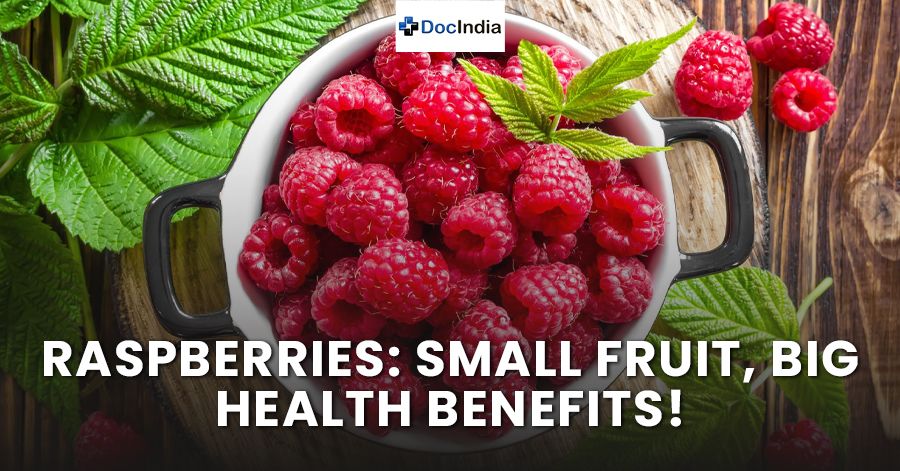Raspberries: Small Fruit, Big Health Benefits!

Health Benefits of Raspberries
Beautifully coloured and incredibly sweet, raspberries are much more than just a tasty garnish for pastries and snacks. These little fruits are an essential component of any well-balanced diet because they are incredibly nutritious and have a wide range of health advantages. Raspberries are a real superfood that merits our attention because they support heart health and immune system function. In-depth investigation into the various ways raspberries support general health is presented here.
1. Nutritional Profile of Raspberries:
Before delving into their health benefits, it's essential to understand the nutritional composition of raspberries. These little gems are low in calories but rich in essential nutrients. A one-cup serving (about 123 grams) of raspberries typically contains:
- Calories: 64
- Protein: 1.5 grams
- Carbohydrates: 14.7 grams
- Fiber: 8 grams
- Fat: 0.8 grams
- Vitamin C: 32% of the Recommended Daily Allowance (RDA)
- Vitamin K: 12% of the RDA
- Manganese: 36% of the RDA
Additionally, raspberries are a good source of antioxidants, including anthocyanins, quercetin, and ellagic acid, which play crucial roles in protecting cells from damage caused by free radicals.
2. Rich in Antioxidants:
Antioxidants are compounds that help neutralize harmful free radicals in the body, thus reducing oxidative stress and lowering the risk of chronic diseases such as cancer, diabetes, and heart disease. Raspberries are particularly abundant in anthocyanins, which give them their characteristic red color. These potent antioxidants have been associated with a reduced risk of cardiovascular disease and improved cognitive function.
3. Supports Heart Health:
Regular raspberry consumption may improve heart health in a number of ways. Because less cholesterol is absorbed into the bloodstream as a result of their high fiber content, cholesterol levels are lowered. Furthermore, the anti-inflammatory qualities of antioxidants like ellagic acid and quercetin, which are present in raspberries, may lower the risk of heart disease by preventing the development of arterial plaque and enhancing blood vessel function.
4. Aids in Weight Management:
Raspberries are a great option for anyone trying to control their weight since, despite their inherent sweetness, they are low in calories and high in fiber. Raspberries' high fiber content contributes to feelings of fullness, which lowers calorie intake overall and supports attempts to lose or maintain weight. Moreover, it has been proposed that the phytochemicals found in raspberries, such as raspberry ketones, may boost metabolism and encourage fat burning.
5. Supports Digestive Health:
Raspberries' high fiber content supports digestive health in addition to helping with weight management. By giving stools more volume, fiber helps people move their bowels more easily and avoids constipation. Raspberries also include prebiotic chemicals, which feed good gut flora and maintain healthy gut flora balance as well as digestive health in general.
6. Boosts Immune Function:
Vitamin C, a potent antioxidant that is essential for maintaining immune system function, is abundant in raspberries. White blood cells, which are vital for fending off infections and diseases, are produced in part by stimulation brought on by vitamin C. Including raspberries in your diet can boost your immunity and lessen the intensity and length of diseases, particularly during the cold and flu season.
7. May Help Prevent Cancer:
The antioxidants present in raspberries, particularly ellagic acid, have been studied for their potential cancer-fighting properties. Ellagic acid has been shown to inhibit the growth of cancer cells and induce apoptosis, or programmed cell death, in various types of cancer, including breast, colon, and prostate cancer. While more research is needed to fully understand the mechanisms behind these effects, including raspberries as part of a balanced diet may contribute to cancer prevention efforts.
8. Supports Cognitive Function:
Raspberries include antioxidants that not only guard against physical illnesses but also promote mental and cognitive wellness. According to studies, flavonoids like quercetin and anthocyanins present in raspberries may aid enhance memory and cognitive function while lowering the risk of age-related cognitive decline and neurodegenerative illnesses like Alzheimer's.
9. Promotes Skin Health:
Raspberries' many antioxidants also make them beneficial for skin health. By shielding the skin from UV rays, toxins in the environment, and other outside stresses, antioxidants can lower the incidence of wrinkles, skin cancer, and premature aging. Moreover, the vitamin C present in raspberries is essential for the creation of collagen, which enhances the firmness and suppleness of the skin.
10. Versatile and Delicious:
Raspberries' culinary adaptability is one of its best qualities. Raspberries are delicious when eaten fresh, frozen, or dried. They may be added to a variety of foods, such as salads and smoothies for breakfast as well as sweets and savory sauces. They are a favorite ingredient for both home cooks and professional chefs because of their sweet-tart flavor, which infuses any meal with a burst of freshness.
To sum up, raspberries are a great complement to any diet because they are tasty and highly nutritious, with a host of health advantages. Berries are a true superfood because of their high antioxidant content, potential cancer-fighting ability, and other attributes. A great method to promote general health and wellbeing is to include raspberries in your diet, whether you like them on their own, in dishes, or blended into smoothies. Proceed to savor these delicious berries and experience the myriad benefits they provide.
